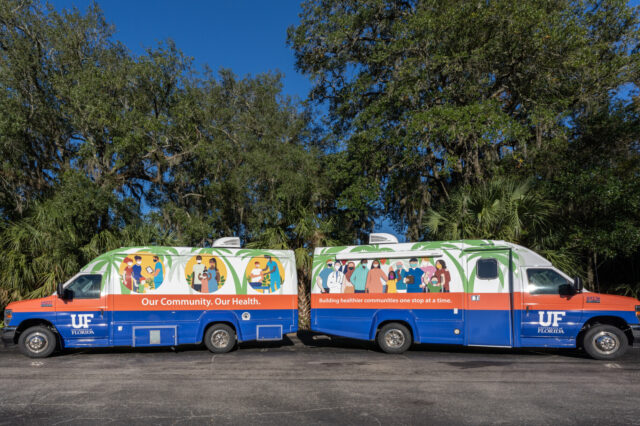UF leads team ready to tackle vaccine skepticism in Florida and beyond

University of Florida faculty are leading a multistate team to boost COVID-19 and influenza vaccination rates in parts of the country where health care skepticism is common and vaccination rates are low. With the emergence of the highly contagious omicron COVID-19 variant, experts say it is more important than ever to provide people with information and access to protective vaccines.
The Our Community, Our Health program reaches community members where they are, through mobile health vehicles, health fairs and events and primary care providers. The program, funded by $6 million in its first year, deploys community health workers or promotoras who work to make health and wellness resources available.
The UF grant provided funding for the initiative to faculty from the University of Minnesota, Washington University in St. Louis, Montefiore Medical Center, the University of Kentucky, the University of Missouri, Florida State University and the University of California, Davis; all lead their Clinical and Translational Science Award, or CTSA, community engagement programs. The communications agency Health Literacy Media is also part of the team.
“This project brings together talented and dedicated scientists who have worked together and with community partners through the CTSA initiative for many years to contribute to the science of community engagement. I am particularly excited to blend the efforts of community health workers and county extension agents,” said Linda B. Cottler, Ph.D., M.P.H., who leads the new grant and is the senior associate dean for research at the UF College of Public Health and Health Professions, part of UF Health, the University of Florida’s academic health center.
Community health workers and newly acquired mobile health vehicles will go to places in Florida to meet people where they are, offering vaccine education and vaccination opportunities. Each site will initiate a community engagement program with CHWs/promotoras modeled after HealthStreet at the UF Clinical and Translational Science Institute.
The local programs in Florida and other states will partner with and prioritize migrant farmworkers and LGBTQ, Native American, Hispanic and Black populations. Extension agents live and work in local communities, where they deliver science-based education in the areas of health equity, youth development, food production, environmental conservation and more. Almost every county in the U.S. has an extension agent who offers highly local information and resources for residents.
“In the first phase of the grant, the teams are surveying local residents to understand their perspectives on vaccinations and gathering their ideas on how to end the pandemic. These data will inform future activities in those communities,” said Catherine W, Striley, Ph.D., M.S.W., M.S.E., deputy director of HealthStreet and co-investigator on the grant.
UF chose the sites on the basis of high vaccine hesitancy rates, limited access to health services and high rates of health conditions associated with poorer health outcomes. UF was selected for funding based on the existing relationship and structure of HealthStreet’s community engagement programs paired with the County Extension model that brings education and information to local residents.
“Cooperative Extension touches communities everywhere, and our connections are going to help us raise up the voices, thoughts, feelings and values of the people who live and work in the communities we also call home. We are proud that their input is going to inform our entire effort,” said Michael Gutter, Ph.D., associate dean of UF/IFAS Extension and co-investigator on the grant.
Other co-investigators at the University of Florida include Lori Bilello, Ph.D.; Michael Lauzardo, M.D.; Sonja Rasmussen, M.D.; Catalina Lopez-Quintero, M.D., Ph.D.; and Henry Young II, M.D., as well as Joedrecka Brown Speights, M.D., from the FSU College of Medicine. Irvin PeDro Cohen, Ed.D., executive director of Local Initiatives Support Corporation in Jacksonville, is the national community advisory board chair.
The grant, called PANDEMIC, or Program to Alleviate National Disparities in Ethnic and Minority Immunizations in the Community, is provided by the CDC’s Partnering for Vaccine Equity program, which awards more than $156 million to partners across the country to help them improve adult vaccination access and increase vaccination rates. Efforts are focused on reaching groups that may experience immunization disparities, including racial and ethnic minorities, people with disabilities, older adults, those living in rural communities and people who have chronic health conditions.
Media contact: Ken Garcia at kdgarcia@ufl.edu or 352-265-9408.
About the authors
